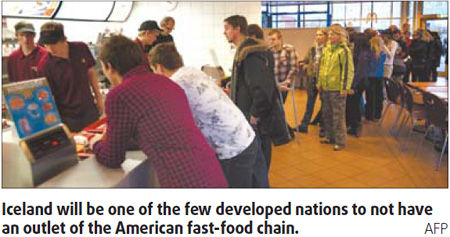
|
WORLD> Europe
 |
|
Icelanders queue up for last Big Mac
(Agencies)
Updated: 2009-11-02 10:49 REYKJAVIK, Iceland: Noisy crowds, long queues, and traffic jams plunged McDonald's restaurants in Iceland into a state of siege on Saturday, as the chain served its final burgers on the island.  Icelanders flooded the three branches of the US fast-food restaurant in Reykjavik several hours before the outlets shut for the last time, forced to close after the island's economic collapse caused running costs to soar.
"With the economy as it is, I won't be traveling abroad any time soon," he added. "It's not that I'm a big fan of McDonald's, but a Big Mac now and then adds to variety." "We are here to say goodbye," said Orri Hreinsson, who was sitting with two friends at a table covered with 12 cheeseburgers. Extra staff were deployed to reinforce the outlets, whose disappearance after 16 years means Iceland will be one of the few Western countries without a presence of the ubiquitous eatery. "I have worked here for six years, and I have never worked as hard as in these final days," one staff member said. Jon Gardar Ogmundsson, who heads the firm Lyst, which operates the Icelandic branches, said at one point there was even a shortage of the chain's trademark Big Mac burger. McDonald's requires all resources for its restaurants, including packaging, meat, vegetables and cheese, to be imported as the Icelandic market is too small to produce the required products. Ogmundsson said the restaurants imported their goods from Germany, but costs had doubled because the country's falling krona currency had made imports prohibitively expensive. |
|||||||